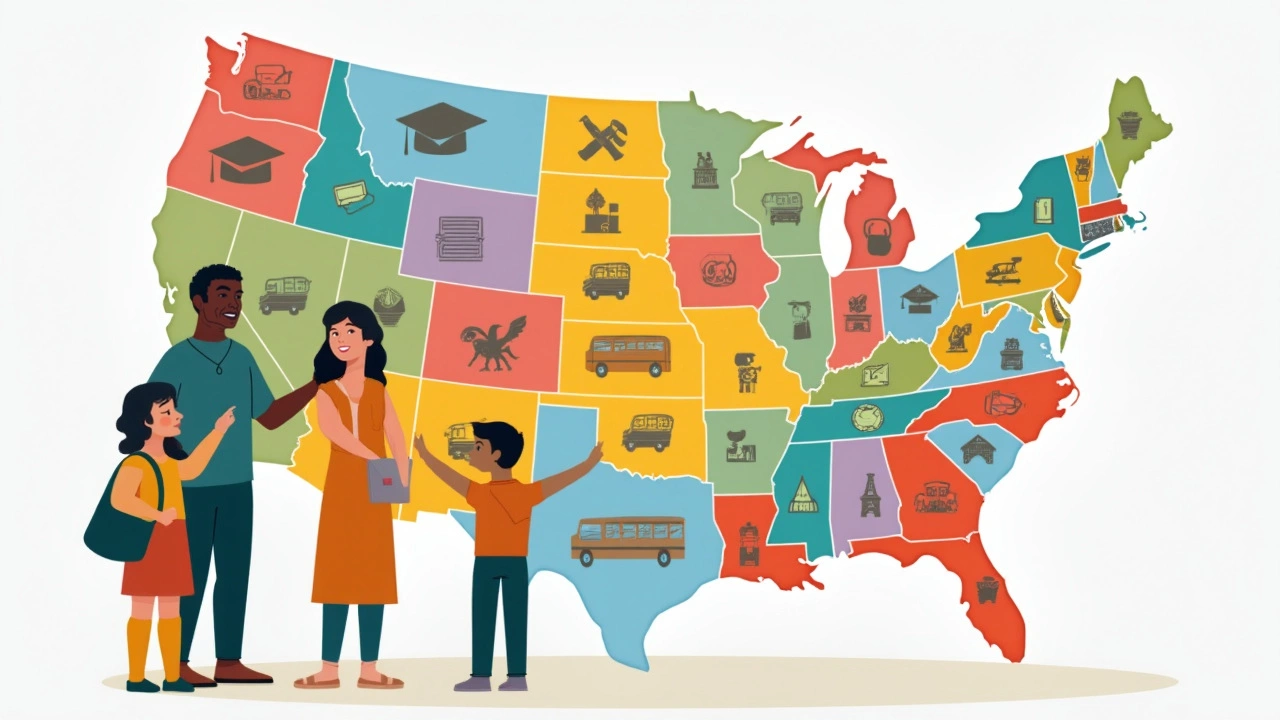Ever feel like deciphering state homeschooling laws is like untangling Christmas lights? You're not alone. Figuring out which U.S. state makes homeschooling straightforward is a hot topic among parents. Believe it or not, some states practically roll out the welcome mat for homeschoolers. They have simple regulations, helpful communities, and minimal red tape.
If you’re looking for states where you can teach without jumping through hoops, places like Alaska, Texas, and Oklahoma often top the list. These states offer freedom with minimal oversight. You won't need to follow strict curriculums or endless paperwork—just focus on your kid's learning journey.
While some states are hands-off, others have supportive communities that make a big difference. Take advantage of local groups, co-ops, and online forums. They can be lifesavers for finding resources and sharing tips with other homeschoolers.
- Understanding State Homeschool Laws
- Top States with Minimal Requirements
- Community and Support Resources
- Tips for Navigating State Rules
- Why Flexibility Matters in Education
Understanding State Homeschool Laws
Diving into state homeschooling laws can sometimes feel like wandering through a legal maze. Each state sets its own rules, and they can vary wildly. But don't sweat it—I’m here to simplify those twists and turns for you.
Some states are the homeschooling equivalents of a walk in the park. Texas, for instance, only requires that you educate your kids at home in any way that looks like school. No forms or submissions. Just teach! Alaska and Oklahoma are similarly relaxed, preferring a hands-off approach, which can be very appealing to parents who want the freedom to design their own educational path.
On the flip side, some states are more hands-on and like things more regulated. For example, New York requires parents to submit detailed lesson plans and regular assessments. They also have a structured mandatory annual testing system. So, if you're considering a move, you'll want to figure out if jumping through hoops is your thing.
There are common categories states use for their laws, like notice requirements, record-keeping, evaluation standards, and subjects taught. Knowing these categories helps you zero in on the specifics. Here's a quick breakdown:
- Notice Requirements: Some states need you to inform them about your intention to homeschool, while others couldn't care less.
- Record-Keeping: A few states want records of educational progress, but many do not. Keeping detailed records, though, could be useful if you ever transition back to traditional schools.
- Evaluation Standards: States like to know if their future residents are getting smarter. So, evaluations could be something you'll need to consider.
- Subjects Taught: Some places like to dictate a certain curriculum, whereas, in others, the world’s your oyster.
Choosing the right state boils down to what kind of relationship you want to have with the state: laid-back and chill or orderly and structured. Understanding the lay of the land beforehand makes homeschooling a lot smoother.
Top States with Minimal Requirements
Diving into homeschooling? You're gonna love states that make life easy with minimal requirements. Some places in the U.S. really stand out when it comes to simple homeschooling laws.
Alaska is a dream if you're after freedom in education. There's no need for teacher qualifications, testing, or reporting. Just teach your kids and let them explore the world! It’s one of the best in terms of flexibility.
Then there’s Texas. The laws here are laid-back, focusing mainly on reading, spelling, grammar, math, and citizenship. That’s about it. You don’t have to file a notice of intent or report progress. Just do your thing!
Oklahoma practically throws you a party. No notice of intent, no testing, no qualification requirements. They trust parents to know what's best for their kids. That kind of trust is kinda special.
Don't forget about Idaho. Like the others, it doesn't require notification, testing, or teacher credentials. Idaho really lets parents steer their educational ship.
Here's a quick glance to compare these states in terms of rules:
| State | Notification Required | Teacher Qualifications | Testing |
|---|---|---|---|
| Alaska | No | No | No |
| Texas | No | No | No |
| Oklahoma | No | No | No |
| Idaho | No | No | No |
It's amazing, right? These homeschooling-friendly states make it way easier to focus on what truly matters—your kid's growth and learning. While the rules might be simple, remember to check in with local homeschooling communities. They can offer tips and extra help along the way!

Community and Support Resources
Diving into homeschooling can feel like you're setting sail on uncharted waters, but fear not! You're not alone on this journey. Across the U.S., particularly in homeschool-friendly states, there are solid support networks ready to give you a hand.
First off, most states have homeschool associations. These groups are like a safety net, providing connections to other families, resources, and even legal support. They often host workshops, organizing everything from field trips to curriculum fairs. Joining one can make you feel part of a community rather than isolated at home.
Another pillar of support is co-ops. These are small groups of homeschooling families who team up weekly or bi-weekly. Someone might teach science, another, art, and so on. It's a great way for parents to share their strengths and lighten your teaching load.
Looking for resources online? You’re covered there too. Websites like HSLDA (Home School Legal Defense Association) offer a wealth of information on legalities and more. Plus, online forums on platforms like Facebook or Reddit can be treasure troves for advice. You can get answers from parents who've been in your shoes.
In many areas, public libraries also serve as fantastic hubs for educational support. They're not just for checking out books anymore. Many offer free classes, workshops, and a space for community gatherings.
Just to give you an idea of how widespread these resources can be, check out this small example of state-level homeschooling associations:
| State | Association |
|---|---|
| California | California Homeschool Network |
| Texas | Texas Home School Coalition |
| Florida | Florida Parent Educators Association |
So, as you embark on your homeschooling adventure, remind yourself that a wealth of resources and a community awaits you. Don’t hesitate to reach out and connect—sharing the journey makes it all the more rewarding.
Tips for Navigating State Rules
Tackling the various homeschooling laws might feel a bit overwhelming, but with the right approach, it doesn't have to be. One of the first moves is to know exactly what your state requires. Some states are strict, while others are more relaxed.
Start with a thorough read of your state's homeschooling laws. You can find these on your state's Department of Education website. Here’s a quick starter guide to navigating these rules:
- Know the Basics: Find out if your state requires you to file a notice of intent to homeschool. States like California and New York expect this paperwork to kick off your journey.
- Understand Testing Requirements: Some places, like Pennsylvania, have annual testing rules, while others, like Texas, have no such mandates. If tests are required, ensure you're scheduling them into your yearly plans.
- Track Learning: Consider whether your state mandates keeping records or portfolios of your child's work. Having these on hand can simplify yearly reviews, especially where evaluations are needed.
- Join a Support Group: Connect with a local or online homeschool group. These folks can be gold mines of information, often sharing effective strategies and tips from firsthand experience.
- Stay Updated: Laws can change, so keep an eye on updates to ensure you're always compliant. Regular check-ins with state education newsletters are a good habit to adopt.
Navigating the world of homeschooling gets easier with time and experience. By equipping yourself with the right information and staying organized, managing your state's rules can become a part of your routine—not a roadblock in it.

Why Flexibility Matters in Education
Flexibility in education isn't just a buzzword; it's the secret sauce for effective learning, especially in homeschooling. Every kid learns differently, so one-size-fits-all methods don't really cut it. When states allow flexibility, parents can tailor education to their child's needs, interests, and pace, turning everyday activities into learning opportunities.
Let's be real: some kids thrive on structure, while others bloom with creative chaos. Flexible homeschooling lets you mix things up. Want to dive into marine biology because your kid loves dolphins? Go for it! Prefer teaching math through cooking? Why not! It turns out that this approach can be super effective. A study highlights that students benefit from customized learning paths, showing better engagement and retention of information.
This flexibility also comes in handy for dealing with unexpected events. Maybe your family decides to travel, or life throws a curveball—flexible homeschooling means your kids won’t miss out on education. They can learn on the go, turning a museum visit or a nature hike into rich educational experiences.
Moreover, states with flexible rules often have vibrant homeschooling communities. This sense of community offers support and resources, making the journey less daunting. Parents swap ideas, share curriculums, and co-create unique educational projects. This network is a goldmine for anyone looking to enrich their child's learning experience beyond traditional school frameworks.

